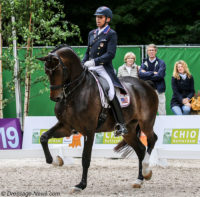World Equestrian Games Dressage Freestyle to Use Degree of Difficulty Format
7 years ago StraightArrow Comments Off on World Equestrian Games Dressage Freestyle to Use Degree of Difficulty Format

Mar. 8, 2018
By KENNETH J. BRADDICK
The Tryon World Equestrian Games dressage Freestyle will use the degree of difficulty format in which riders provide the choreography in advance for judges and commentators, similar to popular sports such as ice skating that generates excitement and engages television and streaming video audiences.
The decision by the International Equestrian Federation (FEI) reverses the action it took late last year. But comments by many top riders indicated strong support for the format that gives them the opportunity to create freestyles to maximize the potential for scores and for judges to know in advance, and not have to guess, the degrees of difficulty of movements.
The system also creates the opportunity for more exciting commentary of television and video streaming of dressage freestyles as the floorplan is available in advance much like ice skating, for example, where viewers alerted of forthcoming difficult movements help build excitement and engagement.
The unanimous change of heart by the FEI’s six-member Dressage Committee came after some leading European riders pushed for a reversal, based partly on their experience of the system that has been mandatory in the nine events of the World Cup Western European League which wraps up this week.
The changed policy became known when stakeholder groups were informed, but the FEI has not yet made the announcement.
Based on assurances it would not be used at WEG in September the system was not used at the major American winter dressage circuits in California and Florida, each of which had four World Cup qualifiers that are now concluded.
Thomas Baur, dressage sports director at the Wellington, Florida Global Dressage Festival and at the Tryon International Equestrian Center, has said previously that when informed officially by the FEI of any change he would implement it quickly, possibly as soon as the final Global event, the CDIO3* Nations Cup, at the end of March but almost definitely at the WEG test event CDI3* in Tryon next month.
Organizers of the Sydney CDI3* in early May, Fritzens, Austria and Aachen, Germany in summer have also announced use of the system.
Anne Gribbons, former U.S. team coach and member of the FEI Dressage Committee who will be president of the ground jury at WEG in September, spoke out against the change on the grounds that countries outside of Europe have had little opportunity to put the system into practice.
Laura Graves, ranked No. 4 in the world on her Verdades and qualified for the World Cup Final in Paris next month where the system will be used, is familiar with the format and said she supports its application at the WEG in Tryon, North Carolina.
Adrienne Lyle, another American and a prospect with Salvino for the U.S. WEG team, said though she had not had experience with the format she is learning from Laura and did not expect to encounter difficulties.
Daniel Göhlen, who developed the software in conjunction with German 5* judge Katrina Wüst, has made a considerable effort to help riders, judges and organizers work with the system and offered to travel to North America, if necessary, to provide support.
The system, he said, levels the playing field because all competitors are treated equally by the degree of difficulty system and makes judging of the freestyles more transparent.
“While I recommend understanding the inner workings of the system as a competitor, it is not necessary in order to benefit from it. We will make sure all freestyles are entered perfectly and are there to help every rider at any point in the preparation.”

